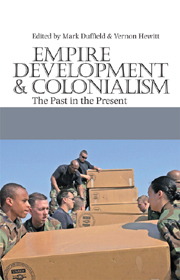Book contents
- Frontmatter
- Contents
- Acknowledgements
- Notes on Contributors
- Introduction
- 1 The Exceptional inclusion of ‘Savages’ & ‘Barbarians’
- 2 Empire, International Development & the Concept of Good Government
- 3 Empire: a Question of Hearts?
- 4 ‘Conflict-Sensitive’ Aid & Making liberal Peace
- 5 Development, Poverty & Famines
- 6 Plain Tales from the Reconstruction Site
- 7 The International Politics of Social Transformation
- 8 Liberal Interventionism & the Fragile State
- 9 Freedom, Fear & NGOs
- 10 Theorising Continuities between Empire & Development
- 11 Spatial Practices & Imaginaries
- 12 Decolonising the Borders in Sudan
- 13 ‘Individualism is, Indeed, Running Riot’
- Index
10 - Theorising Continuities between Empire & Development
Toward a New Theory of History
Published online by Cambridge University Press: 05 February 2013
- Frontmatter
- Contents
- Acknowledgements
- Notes on Contributors
- Introduction
- 1 The Exceptional inclusion of ‘Savages’ & ‘Barbarians’
- 2 Empire, International Development & the Concept of Good Government
- 3 Empire: a Question of Hearts?
- 4 ‘Conflict-Sensitive’ Aid & Making liberal Peace
- 5 Development, Poverty & Famines
- 6 Plain Tales from the Reconstruction Site
- 7 The International Politics of Social Transformation
- 8 Liberal Interventionism & the Fragile State
- 9 Freedom, Fear & NGOs
- 10 Theorising Continuities between Empire & Development
- 11 Spatial Practices & Imaginaries
- 12 Decolonising the Borders in Sudan
- 13 ‘Individualism is, Indeed, Running Riot’
- Index
Summary
Introduction
At the risk of adding to an already voluminous literature, this chapter begins with a question: how is it that the promises of the short twentieth century have ended in the return of empire? Accompanying and prompted by the terror wars is an emerging spate of academic literature, translated into public and popular discourse, narrating this contemporary moment as a ‘new’ era of imperialism (Cooper 2002a and b; Harvey 2003; Cox 2003a and b; Saull 2004; Mann 2004; Ikenberry 2004; wade 2004), for which it is largely apologetic, or a ‘new’ globalised empire (Hardt and Negri 2001) which is distinct from the European state-led empires which precede it. The academic debate on the left has configured largely around Hardt and negri's now seminal work (Balakrishnan 2003), and the debate on the right has made the case for a New American Century of intervention and state reconstruction (Mabee 2004; Ignatie. 2003). In the popular domain, Niall Ferguson's Empire has been televised, his Colossus much publicised, and the reconfiguring of imperialism as a history wrongfully maligned has appeared here and there in the popular press as it has in academic discourse. The history and historiography of empire is long and complex and, given the events of the twentieth century, part of my argument is that its vigorous resurgence at the dawn of the twenty-first century as a figure in discourse is significant. This chapter poses the question, what is at stake in the furore over empire?
- Type
- Chapter
- Information
- Empire, Development and ColonialismThe Past in the Present, pp. 146 - 160Publisher: Boydell & BrewerPrint publication year: 2009



